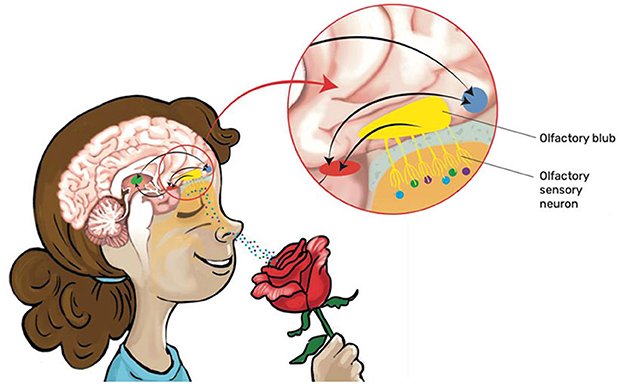The olfactory system plays a fascinating and essential role in our daily experiences, particularly in how we perceive scents. Essential oils, widely known for their therapeutic properties, interact with this sensory system to produce effects on both the brain and the body. The way essential oils are processed by the olfactory system not only influences our mood, memory, and emotions but also has potential health benefits. Understanding the science behind smell and how it connects to essential oils offers insight into why aromatherapy has become such a popular wellness practice.
This article delves into the intricate workings of the olfactory system and how essential oils interact with it, unlocking numerous physical and mental benefits. For a broader understanding of how essential oils function, refer to this detailed guide on essential oil science.
How the Olfactory System Works

Understanding the Olfactory Pathway
The olfactory system is responsible for detecting odors and transmitting this information to the brain. When you inhale an essential oil, scent molecules travel through the nasal cavity and bind to olfactory receptors located on specialized sensory neurons. These receptors convert chemical signals into electrical impulses, which are then transmitted to the brain’s olfactory bulb.
The olfactory bulb, positioned just above the nasal cavity, is closely connected to regions of the brain that control emotions and memory, such as the hippocampus and amygdala. This explains why a simple whiff of a scent can evoke powerful memories or emotional responses.
How Essential Oils Activate the Brain
Essential oils contain volatile compounds that make them uniquely suited to stimulate the olfactory system. For instance, when inhaling lavender oil, linalool and linalyl acetate—two major components—bind with olfactory receptors, triggering a calming effect in the brain. This process is also responsible for the mood-enhancing properties of citrus oils like bergamot and lemon, which stimulate the release of serotonin, the brain’s “feel-good” chemical.
The Role of the Limbic System
The limbic system, a critical part of the brain involved in emotional regulation and memory, plays a significant role in how we process smells. Essential oils can influence the limbic system, creating shifts in mood, relaxation, or alertness. Aromatherapy’s ability to alleviate stress, anxiety, and even depression is tied to the powerful connection between smell and the limbic system. The limbic system’s interaction with the olfactory system is key to understanding the therapeutic benefits of essential oils.
The Connection Between Essential Oils and Mood Regulation

How Smell Influences Emotions
One of the most powerful effects of the olfactory system is its influence on emotions. The olfactory nerve has direct access to the limbic system, particularly the amygdala, which governs emotions like fear, pleasure, and anger. This connection means that certain essential oils can evoke specific emotional responses almost immediately.
For example, peppermint oil is known to invigorate and energize, while chamomile has a soothing effect on the nervous system. Studies have shown that lavender oil reduces anxiety by affecting the amygdala and hippocampus, helping to balance emotions and promote relaxation.
Aromatherapy for Stress and Anxiety Relief
Lavender, chamomile, and bergamot oils are widely used in aromatherapy due to their ability to reduce stress and anxiety. Inhaling these oils engages the olfactory system, which in turn affects the limbic system, reducing the levels of cortisol, the stress hormone, in the body. Regular use of essential oils as part of stress management routines can promote a state of calm and relaxation, enhancing overall well-being.
Research published in the Journal of Alternative and Complementary Medicine found that lavender oil reduced anxiety levels in patients undergoing stressful medical procedures. This evidence suggests that essential oils can be a valuable tool for those seeking natural alternatives to conventional treatments for anxiety.
Mood-Enhancing Essential Oils: A Quick Guide
| Essential Oil | Key Benefits | Main Active Components |
|---|---|---|
| Lavender | Anxiety relief, relaxation | Linalool, linalyl acetate |
| Peppermint | Energizing, mental clarity | Menthol, menthone |
| Bergamot | Mood elevation, stress reduction | Limonene, linalool |
| Chamomile | Calming, emotional balance | Alpha-bisabolol, chamazulene |
By choosing essential oils based on their mood-enhancing properties, individuals can tailor their aromatherapy practices to meet specific emotional needs.
Memory and Cognition: How Essential Oils Enhance Brain Function

The Link Between Smell and Memory
The olfactory system’s unique connection to the brain’s memory center, the hippocampus, makes smell one of the strongest triggers for memory recall. Essential oils like rosemary have been shown to enhance memory retention and cognitive performance, especially in tasks requiring concentration and attention.
In a study conducted by the Northumbria University, participants exposed to rosemary essential oil performed significantly better in memory tests. The active compound, 1,8-cineole, is thought to increase acetylcholine, a neurotransmitter that plays a key role in learning and memory.
Cognitive Benefits of Essential Oils
Using essential oils for cognitive enhancement has gained popularity due to their neuroprotective properties. Oils like rosemary and peppermint are rich in antioxidants, which protect brain cells from oxidative damage, potentially slowing cognitive decline. Regular exposure to these oils through inhalation or diffusion has been linked to improved focus, mental clarity, and even better decision-making abilities.
The Potential Health Benefits of Essential Oils for Brain Health

Neuroprotective Effects of Essential Oils
The olfactory system does more than just process scents; it may also contribute to brain health. Essential oils such as frankincense and sandalwood contain compounds that offer neuroprotective benefits, reducing inflammation and promoting healthy brain function. For example, frankincense has been shown to protect against neuronal damage, which is a key factor in neurodegenerative diseases like Alzheimer’s.
How Essential Oils Support Overall Brain Health
Essential oils rich in antioxidants and anti-inflammatory properties can support overall brain health by reducing oxidative stress. This is critical in preventing age-related cognitive decline. Oils like rosemary and frankincense are believed to promote neurogenesis, the process of creating new neurons, which can aid in maintaining cognitive function over time.
For more insights into how essential oils can affect brain health, this comprehensive guide provides an excellent overview.
How to Incorporate Essential Oils into Your Daily Routine for Maximum Benefit

Practical Tips for Using Essential Oils
Incorporating essential oils into your daily life is simple and can yield significant benefits. Whether through diffusers, topical application, or even aromatherapy jewelry, there are numerous ways to harness the power of scent.
- Diffusion: Using an essential oil diffuser is one of the most effective methods to fill your space with therapeutic aromas. Oils like lavender and eucalyptus work well in the evening to promote relaxation.
- Topical Application: Applying diluted essential oils to pressure points such as the temples or wrists allows for direct absorption through the skin and provides localized benefits.
Combining Oils for Synergy
Certain essential oils work better in combination. For instance, blending lavender and frankincense creates a powerful mixture that promotes relaxation while also supporting cognitive health. Experimenting with different combinations can enhance the effects and target specific needs, whether for relaxation, focus, or energy.
Conclusion
The olfactory system’s role in processing essential oils opens up a world of mental, emotional, and physical benefits. Whether it’s improving mood, enhancing memory, or protecting brain health, the interaction between scent molecules and our brain is profound. Essential oils are a natural and accessible way to support both mental clarity and emotional well-being, making them an invaluable tool in any wellness routine.
As the science behind the olfactory system and essential oils continues to evolve, the potential for new therapeutic applications grows. Incorporating essential oils into your daily life is a simple yet effective way to improve both your mental and physical health naturally.









